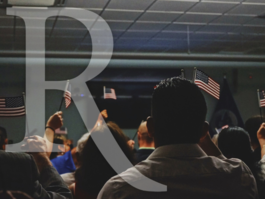Washington Is Nuts
A Commentary By Tony Blankley
Want to hear a real laugher? Despite the current disharmony in politics, there's one policy on which all of Washington agrees. Republicans and Democrats, House and Senate, president and Congress all agree that after last fall's financial crisis, the federal government has to regulate the financial industry more closely to protect our economy from risk of systemic financial collapse.
Here's the joke. As boom- and bust-prone as high finance always has been and remains, the greatest systemic risk to our economy is not Wall Street. It's the growing federal debt (and weakening dollar) being enacted by those Washington politicians -- the ones who want to protect us from Wall Street.
It soon may be not a risk but a certainty of generations-long economic stagnation and hard times as a direct result of "unsustainable" and ever-growing national debt, driven by a federal budget almost half of which is to be paid for each year by borrowing money -- primarily from China -- and already weakening the dollar such that foreigners are trying to get rid of their dollars any way they can.
Don't take my word for it. In June, the Congressional Budget Office published "The Long-Term Budget Outlook," its summary reading in part: "The federal budget is on an unsustainable path -- meaning that federal debt will continue to grow much faster than the economy over the long run. ... Rising costs for health care and the aging of the U.S. population will cause federal spending to increase rapidly. ...
"... Large budget deficits would reduce national saving, leading to more borrowing from abroad and less domestic investment, which in turn would depress income growth. ... The accumulation of debt would seriously harm the economy. Alternatively, if spending grew as projected and taxes were raised in tandem, tax rates would have to reach levels never seen in the United States (highest marginal income tax rate so far: 94 percent, in 1944-45). High tax rates would slow the growth of the economy, making the spending burden harder to bear."
And yet the same Congress and president who want to stop the banks from taking too much risk cannot stop themselves from ever more deficits. Indeed, so intoxicated -- nay, hypnotized! -- by debt is the current government that it is not even proposing to try to cut back.
Last week saw, at the same time: 1) the world shuddering about the debt-driven weakening dollar ("The biggest story in the world economy is the continuing fall of the U.S. dollar, or at least it is everywhere outside of Washington, D.C., the place most responsible for its declining value." -- The Wall Street Journal) and 2) Washington cheering Sen. Max Baucus' health bill's spending levels ("Health Care Bill Gets Green Light in Cost Analysis" -- The New York Times).
That's right. The federal government is giving the "green light" for the country to drive to the poorhouse -- and drive there, I would argue, by way of the lunatic asylum. Are they nuts? Consider a few details.
Before the Baucus health bill is enacted, $9.3 trillion of newly created deficit already has been added to the national debt. The Baucus bill is considered a triumph of careful budgeting because it may cost only $829 billion -- and will not add to that unsustainable deficit because it is to be paid for by cutting Medicare and other programs by about $400 billion and raising taxes primarily on health care insurance by about $400 billion.
Now, forget for the moment that even the Congressional Budget Office doesn't believe its own numbers. (Last week, CBO Director Douglas Elmendorf wrote to Baucus, warning, "Long-term budgetary impact could be quite different if those provisions were ultimately changed." That is, CBO must score the cuts called for by the bill. However, Congress invariably fails to actually implement the painful cuts, but it does keep or increase the benefits. That is why entitlement programs always cost much more than is predicted.)
But let's assume the numbers are real. This is still insane. Remember, until a few months ago, President Barack Obama insisted on passing health care legislation this year (during the economic crisis we are still in) because it would lower overall costs -- a necessary step for a return to a healthy economy.
But neither he nor Congress could design a bill that saved money. So they are settling for not adding to the "unsustainable" current deficit.
Here's a thought: As shrinking the unsustainable deficit is a critical prerequisite for a healthy economy, why not just enact the $400 billion of Medicare cuts and $400 billion of health insurance tax increases -- thereby reducing the 10-year deficit by about $1 trillion (when you count reduced interest payments) -- but don't provide the new entitlement benefits that were the purpose of the bill?
Helping out the uninsured might be a nice notion someday. But the first priority now is to avoid permanently destroying our economic capacity -- as we rapidly are doing -- by the insanity of adding to entitlement programs while the dollar begins to fail and the CBO predicts we never will recover from the current debt and deficit levels. So cut the 10-year deficit by that almost $1 trillion.
Then incrementally move the eligibility age for Medicare and Social Security to 70 by 2030. That would reduce their costs by about 3 percent of gross domestic product, which is about what it would take to keep them functioning without bankrupting America. It's a start.
Stop the madness. Don't increase benefits; cut costs. Now. It's doable -- except for the fact that Washington is nuts.
Tony Blankley is executive vice president of Edelman public relations in Washington.
COPYRIGHT 2009 CREATORS SYNDICATE INC.
See Other Commentaries by Tony Blankley
See Other Political Commentary
Views expressed in this column are those of the author, not those of Rasmussen Reports.
Rasmussen Reports is a media company specializing in the collection, publication and distribution of public opinion information.
We conduct public opinion polls on a variety of topics to inform our audience on events in the news and other topics of interest. To ensure editorial control and independence, we pay for the polls ourselves and generate revenue through the sale of subscriptions, sponsorships, and advertising. Nightly polling on politics, business and lifestyle topics provides the content to update the Rasmussen Reports web site many times each day. If it's in the news, it's in our polls. Additionally, the data drives a daily update newsletter and various media outlets across the country.
Some information, including the Rasmussen Reports daily Presidential Tracking Poll and commentaries are available for free to the general public. Subscriptions are available for $4.95 a month or 34.95 a year that provide subscribers with exclusive access to more than 20 stories per week on upcoming elections, consumer confidence, and issues that affect us all. For those who are really into the numbers, Platinum Members can review demographic crosstabs and a full history of our data.
To learn more about our methodology, click here.



